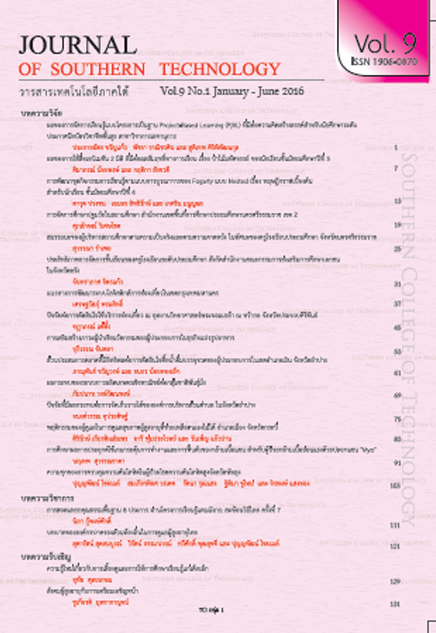ประสิทธิภาพการจัดการความรู้ตามทัศนะของผู้บริหารและครูโรงเรียนเอกชนในจังหวัดนครศรีธรรมราช
Main Article Content
Abstract
การวิจัยเรื่องนี้มีวัตถุประสงค์เพื่อ (1) ศึกษาประสิทธิภาพการจัดการความรู้ตามทัศนะของผู้บริหารและครูโรงเรียนเอกชนในจังหวัดนครศรีธรรมราช (2) เปรียบเทียบประสิทธิภาพการจัดการความรู้ จาแนกตามเพศ วุฒิการศึกษา ตาแหน่งการปฏิบัติงานและประสบการณ์ทางาน และ (3) ศึกษาข้อเสนอแนะและแนวทางการดาเนินงานจัดการความรู้ กลุ่มตัวอย่างที่ใช้ในการวิจัยได้แก่ ผู้บริหารและครูจานวน 290 คน ได้มาจากการสุ่มแบบแบ่งชั้น ตามเขตพื้นที่การศึกษาประถมศึกษานครศรีธรรมราช เครื่องมือที่ใช้ในการรวบรวมข้อมูล เป็นแบบสอบถามประสิทธิภาพการจัดการความรู้ ด้านการกาหนดความรู้หรือการบ่งชี้ความรู้ ด้านการแสวงหาและสร้างความรู้ ด้านการประมวลและกลั่นกรองความรู้ ด้านการจัดเก็บความรู้ให้เป็นระบบ ด้านการแบ่งปันและแลกเปลี่ยนความรู้ และด้านการนาความรู้ไปใช้ เป็นแบบมาตรประมาณค่า 5 ระดับ และแบบสอบถามปลายเปิด โดยมีค่าความเชื่อมั่นของแบบสอบถามในภาพรวม .96 สถิติที่ใช้ในการวิเคราะห์ ได้แก่ ค่าร้อยละ ค่าเฉลี่ย และค่าเบี่ยงเบนมาตรฐาน ทดสอบสมมติฐานด้วยการวิเคราะห์ความแปรปรวนทางเดียว และเปรียบเทียบพหุคูณด้วยวิธี LSD.
ผลการวิจัยพบว่า ประสิทธิภาพการจัดการความรู้ตามทัศนะของผู้บริหารและครูโดยภาพรวมอยู่ในระดับดี ผู้บริหารและครูที่มีเพศต่างกันมีทัศนะต่อประสิทธิภาพการจัดการความรู้แตกต่างกันอย่างมีนัยสาคัญทางสถิติที่ระดับ .05 ผู้บริหารและครูที่มีวุฒิการศึกษาต่างกันมีทัศนะต่อประสิทธิภาพการจัดการความรู้โดยภาพรวมไม่แตกต่างกัน ผู้บริหารและครูที่มีตาแหน่งการปฏิบัติงานต่างกันมีทัศนะต่อประสิทธิภาพการจัดการความรู้โดยภาพรวมแตกต่างกันอย่างมีนัยสาคัญทางสถิติที่ระดับ .05 ผู้บริหารและครูที่มีประสบการณ์ทางานต่างกันมีทัศนะต่อประสิทธิภาพการจัดการความรู้โดยภาพรวมแตกต่างกันอย่างมีนัยสาคัญทางสถิติที่ระดับ .01 ข้อเสนอแนะจากโรงเรียนที่จัดการความรู้มีประสิทธิภาพ จาแนกได้ 4 ประการ คือ ประการที่หนึ่ง โรงเรียนควรกาหนดตัวชี้วัดความรู้และการประมวลผลความรู้ ประการที่สอง โรงเรียนควรส่งเสริมการเรียนรู้แก่ครูผู้สอนและแลกเปลี่ยนความรู้กันระหว่างโรงเรียน ประการที่สาม โรงเรียนมีเครื่องมือและเทคโนโลยีที่ทันสมัยสาหรับการจัดการความรู้ และประการสุดท้าย โรงเรียนพัฒนาระบบฐานข้อมูลด้วยคอมพิวเตอร์เพื่ออานวยความสะดวกในการประยุกต์ใช้จัดการความรู้ 6 ด้าน เป็นวงจรอย่างต่อเนื่องให้เกิดประโยชน์สูงสุด
The Efficiency of Knowledge Management as Perceived by Administrators and Teachers of Private School
in Nakhon Si Thammarat
This research aimed to (1) examine and compare the efficiency of knowledge management as perceived by administrators and teachers of private schools in Nakhon Si Thammarat recording to gender, educational background, work position and work experience; and (2) study their suggestions for operating effective knowledge management. A sample of 290 administrators and teachers of private schools were selected through stratified random sampling by education service areas. A five-point Likert rating scale and open-ended questionnaire with overall reliability of .96 were employed as the research instrument. Percentage, mean, standard deviation, one-way ANOVA and LSD were used in data analysis.
The finding revealed that the administrators and teachers rated the effectiveness of knowledge management at a good level. In addition, there are differences in gender, educational background, but the work positions did not result differences in the perceptions. However, a statistical difference was found in the perceptions held by administrators and teachers of differences work experiences at .05 level of significance. There are four suggestions given by the administrators and teachers. First, the schools should set out knowledge indicators and knowledge processing. Second, the schools should promote teachers learning and sharing knowledge among themselves within the schools, and with others outside schools. Third, the schools should be equipped with the tools for knowledge management. Last, the schools should have developed database via computers to facilitate the application of knowledge for highest benefits.
Article Details
-
Authors must agree to the journal publication rules and allow the editors to edit the manuscripts for publication.
-
Author’s right belongs to the author but Journal of Southern Technology holds the right of first publication and thus allow readers to use the article for the purpose of education but not commercial.

